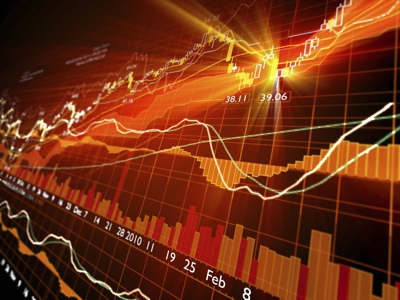A magazine where the digital world meets the real world.
On the web
- Home
- Browse by date
- Browse by topic
- Enter the maze
- Follow our blog
- Follow us on Twitter
- Resources for teachers
- Subscribe
In print
What is cs4fn?
- About us
- Contact us
- Partners
- Privacy and cookies
- Copyright and contributions
- Links to other fun sites
- Complete our questionnaire, give us feedback
Search:
Making money from technology

Communication technology changes the way people do business. As each new generation of technology comes along, there are new opportunities to make money. The history of the stock market is a good example.
The London Stock Exchange started life in the 17th century in coffee shops where people would meet and discuss commerce. People started to use the coffee shops to trade including buying and selling shares in companies. If you needed to raise money, that was the place to go. This was obviously good business for the coffee shop owners too. John Castaing began to publish a list of prices twice a week and that cemented his coffee shop as the place to trade.
Eventually a group of traders built their own building with a dedicated dealing room and the Stock Exchange as we know it was born. At this point, chalk was the state of the art in display technology as prices started to be written up on chalkboards.
Information is always a good thing to have and that’s even more true when you are doing deals – knowing that a ship with its cargo has arrived safely before everyone else gives you an edge. That means you need some kind of communication technology to get the information to you in the first place. The faster the technology you have the bigger your advantage. Early technology wasn’t based around computer networks of course, it was horse-flesh based. Messengers on horseback would rush to London with any news that might give a trading edge.
Find a faster way of sending a message than a horse rider though and you have the edge. This was demonstrated by Nathan Rothschild at the Battle of Waterloo. No one knew who would win but obviously the result would make a big difference on the markets. In particular, if Napoleon won, British government bonds would become worthless. The story goes that Rothschild realised homing pigeons could get the result of the battle to him faster than anyone else so he shipped pigeons out to the battle field (and made sure everyone knew how clever he was to have done so!)
The battle ended and his pigeons arrived long before any horse-backed messenger, telling him that Napoleon had lost. Rather than buying bonds, though he did the opposite and immediately started selling them. People knew he must know the result of the battle because the pigeons had returned. The fact he was offloading bonds also told them (they thought) that Napoleon had won so everyone started to sell. The price crashed. Anyone wanting to buy bonds could now get them ridiculously cheaply. Little did they know that the people buying were a group of Rothschild’s assistants! Of course when the horse riders arrived with the news that Napoleon had actually been defeated the price shot back up and Rothschild could sell at a healthy profit. By having better communication technology and using the information he had in a canny way, Rothschild made a killing (though probably not enough to make up for his losses as a result of an earlier bet on it being a long war).
Of course soon pigeons were a defunct technology too and chalkboard display technology didn’t survive either, as the telegraph took over. A system was invented for the telegraph information to be printed on ticker tape. Eventually an enterprising company worked out a way to project the moving ticker tapes onto a big screen and chalk was history.
As the Internet appeared, in the 1980s the scene was set for another shift. Michael Bloomberg realised that financial companies would pay for fast, high quality financial information so he set up a company that produced computer terminals for traders ... and became rich as a result. Of course once information is being delivered in digital form computers can do things with it themselves. Who needs humans? In the last 10 years the traders have gone – the people replaced by software that can make decisions based on the incoming information (and without display technology at all) much more quickly.
Another reason computer traders turn out to be especially useful is to salami slice large orders. Suppose you want to buy 5 million shares in a company. If you buy them in one go then just the fact that you are buying so many will raise the price (just as Rothschild’s selling caused the price to drop). If on the other hand you get an army of helpers each buying a few shares, it will take time before anyone realises what is going on (again just as no one realised it was really Rothschild doing all that buying). That means there will be no impact on the price. It’s hard to find several million people to act as helpers but software helpers are easy to clone. Introducing a new technology led again to a commercial advantage.
The history of the stock market is a history of ever improving communication technology. Those getting and reacting to information the fastest have always had an advantage. Those that saw the potential of a new technology were also able to make a killing. The question is what technology comes next? Work that out and take advantage of it and you could be the next person to make a mint.
This article is based on part of a lecture given by Dave Cliff of Bristol University in June 2012.


